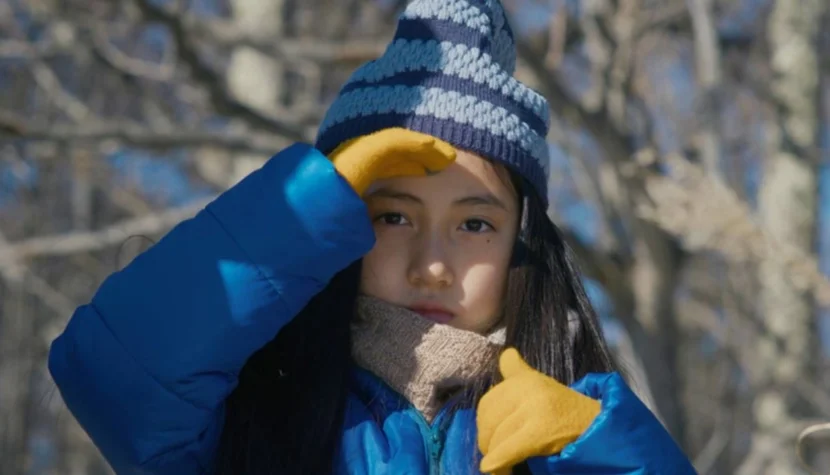EVIL DOES NOT EXIST. There Are Only People and Their Interests [REVIEW]

Ryûsuke Hamaguchi, much like Jonathan Glazer in “The Zone of Interest” begins his latest film with a sort of prelude. The camera slowly pans, revealing treetops, accompanied by Eiko Ishibashi’s melancholic soundtrack in the background—brass and string instruments, full-on old-school. This goes on for quite a few minutes. Before showing us the characters and letting us hear the first dialogues, Hamaguchi gently introduces us to the depicted world. We softly land on the snow in a Japanese province: amidst a forest, by a murmuring stream. The idyll is disrupted by a disturbing, sudden sound off-screen—a gunshot. Somewhere around the corner, danger lurks. Still unseen but present.
“They’re hunting deer,” explains the main character in a later scene. Takumi is a respected member of the local community, a kind of local “expert,” meaning he’s a specialist in everything. He doesn’t speak too often but always with purpose. He’s helpful and obliging—”just ask nicely.” He lives in the woods, in harmony with nature, along with his daughter, whom he regularly forgets to pick up from school—yet the bond between the two is strong, cemented by shared walks and conversations. Takumi’s and other villagers’ lives begin to tremble when representatives of a Tokyo-based startup arrive to plan the construction of a “glamping” site (i.e., a camping site for the affluent). The shots heard at the beginning of the film take physical form, manifesting as a project that could lead to irreversible contamination of local groundwater.

The crux of the film, according to the Japanese director, builds on the classic opposition of rural versus urban. As one might guess, it leans heavily in favor of the former—a threatened idyllic community facing outside intervention. Hamaguchi complicates matters through his “urban” characters—two employees from Tokyo corporations. They started as talent scouts, but fate—or the opportunity for pandemic funding—pushed them towards the “glamping” project. Just when we think we’ve figured out Hamaguchi and will solely witness Takumi’s and his daughter’s trials, the director flips the narrative upside down, focusing on the two Tokyoites, making them the true protagonists of the latter half of the film. By revealing details about the characters’ pasts, he allows us to understand their motivations and even grow fond of them. Ultimately, as the film’s title suggests, there is no evil—only people, environmentally determined, entangled in situations and interests beyond their control.
Hamaguchi executes several narrative somersaults like this. He prevents us from settling comfortably into his film, constantly surprising us and pulling us out of our comfort zone. He juggles perspectives and conventions, smoothly transitioning between family drama, ecological manifesto, and a thriller with a child’s disappearance in the background. In one scene, he employs several formal techniques that seemingly don’t mesh on paper. He films a forest walk first with a static camera, then with a gentle panorama, and finally with a shaky handheld camera. This consistent inconsistency subconsciously affects our perception. It builds subtle, ever-growing tension, accompanied by sounds of gunfire and a fatalistic atmosphere, casting a vision of irresponsible globalization over the village. Above all, Hamaguchi’s latest work is a “slow burner.” A film that hypnotizes, holds us to the screen, subtly enticing us with the promise of a strong climax. Nothing seems to happen, yet we clench our fists in our pockets, nervously squirming in our cinema seats. And in the end, we get what we were waiting for: in a controversial, slightly kitschy—unfortunately—finale, the accumulated tension is released, leading to a sudden and consequential outburst of violence.

Hamaguchi is a titan of contemporary realism. He is strongest when firmly grounded. There are exceptionally well-written and staged fragments in “Evil Does Not Exist.” So precise and thoughtful that they could successfully imitate a documentary—such as the fifteen-minute verbal confrontation between the village residents and the Tokyo newcomers, reminiscent of a church assembly scene from “Spotlight.” The Japanese director has an incredible ear for dialogue and a directorial sensibility worthy of the greatest slow cinema auteurs. A conversation about dating apps or a static shot of chopping wood can be turned into an engaging, genuinely realistic spectacle. Here is our Éric Rohmer and Yasujirō Ozu of the present day—though it’s a pity that he needlessly floats off into the air at the end.

